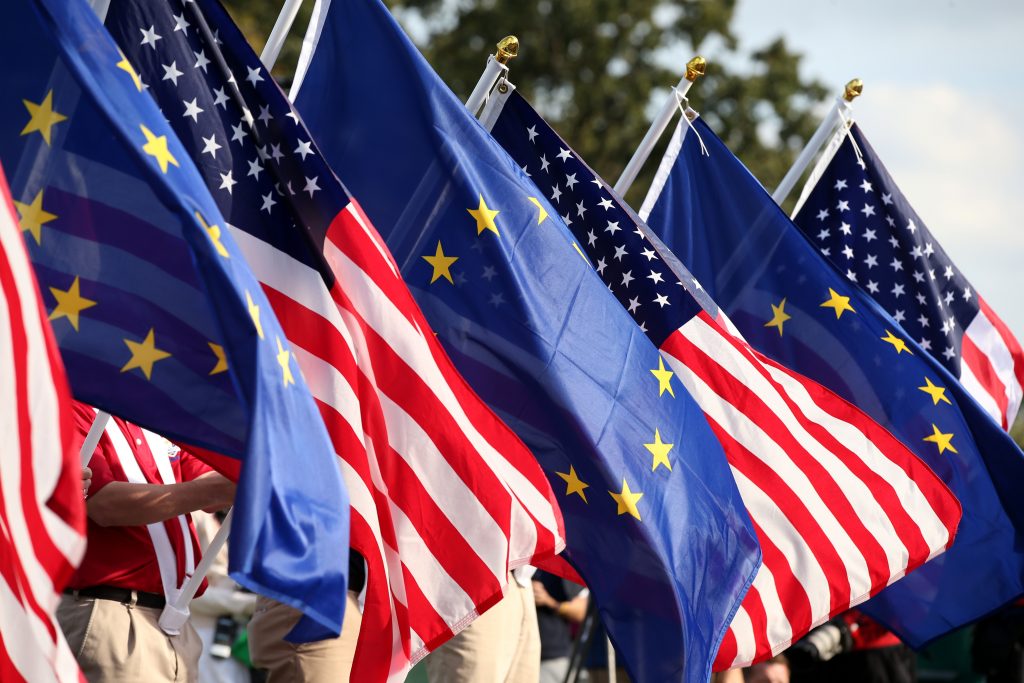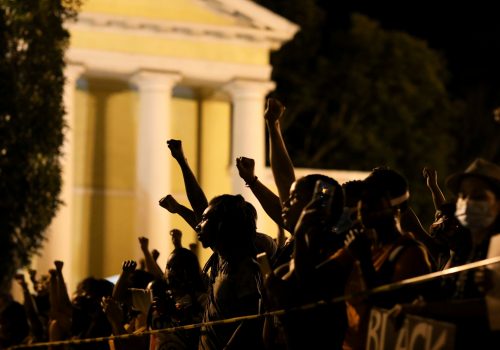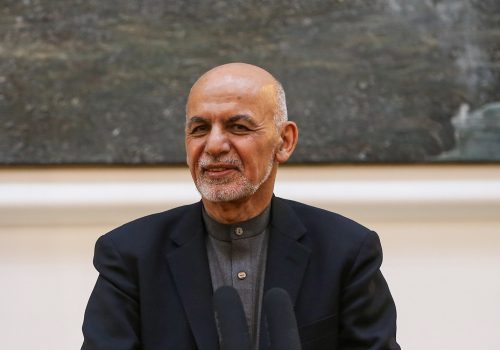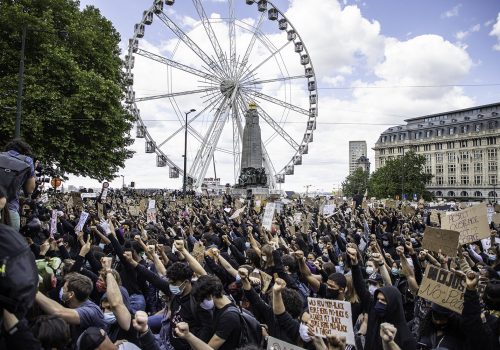It’s time to take urgent measures to head off the danger of “transatlantic decoupling,” a strategic shift that would put at risk more than seven decades of gains in democracy, open markets and individual rights.
With all the recent attention to the ongoing economic and technological decoupling of the United States and China, far too little attention has been paid to a slower-moving, dangerously growing transatlantic divide.
Unaddressed, the result could be a tectonic strategic shift away from the trans-continental relationship that built and defined post-World War II Europe and shaped the last 75 years globally. At a time when the global balance of power is shifting in China’s direction, a de-coupling of the United States and Europe could be a decisive geopolitical factor.
The damage would be far-reaching for America’s worldwide interests, for European unity and influence, and for the most significant community of democracies and open-market economies the world has ever known, accounting for nearly half of global GDP.
Get the Inflection Points newsletter
Subscribe to Frederick Kempe’s weekly Inflection Points column, which focuses on the global challenges facing the United States and how to best address them.
“The challenges that we face over the next decade are greater than any of us can tackle alone,” said NATO Secretary General Jens Stoltenberg this week at a virtual event staged by the Atlantic Council and the German Marshall Fund. “Neither Europe alone, nor America alone. So, we must resist the temptation of national solutions.”
He launched a significant, if insufficient, first step in addressing this transatlantic danger: NATO 2030. Its aim would be to ensure that, while the alliance remains militarily strong, it would become stronger politically and globally ensure its relevance in the face of a more assertive China and a global pandemic.
“The rise of China is fundamentally shifting the global balance of power,” he said. “Heating up the race for economic and technological supremacy. Multiplying the threats to open societies and individual freedoms. And increasing the competition over our values and our way of life.”
New tensions have highlighted the dangers of transatlantic decoupling.
The most recent were triggered by President Trump’s decision last week, though not yet implemented, to withdraw 9,500 troops from Germany, afterward capping them at 25,000. The President’s misplaced argument that the troops are there to defend Germany failed to appreciate that the presence is more in America’s interests.
The troop presence allows the United States to deploy more rapidly to other parts of Europe, Africa and the Middle East. It facilitates training with our friends and allies, and it provides deterrence for NATO allies east of Germany.
Yet it was less the decision that irked allies than the timing and apparent failure to have consulted them. The withdrawal announcement came just days after German Chancellor Angela Merkel’s decision not to attend in-person the G-7 meeting President Trump had hoped to host this month.
At the same time, differences are festering between European countries and the United States about how best to manage an increasingly assertive China, particularly as Beijing-Washington tensions grow. European concerns about China have also deepened, but Washington’s rapid moves to punish China for its move to limit Hong Kong’s autonomy contrast with Brussels’ more muted response and determination to avoid sanctions.
Alongside the launch of NATO 2030 this week, another promising idea to better coordinate responses to China has emerged from British Prime Minister Boris Johnson. He has suggested employing a “D-10” of ten leading democracies to tackle their increasing concerns about supply chain vulnerabilities and 5G mobile communications.
That would augment the G-7 membership by adding Australia, India and South Korea, and shift the focus from the concept of the leading global economies to the leading world democracies.
This isn’t a new idea, with regular meetings of ambassadors and policy planners among those countries convened for some years by the Atlantic Council, but the coronavirus has given the idea new impetus.
Tensions aren’t new in transatlantic relations. The reason to act more decisively now is the historic moment, a new era of major power competition that will define the years ahead. During the Cold War, the nature of the Soviet threat and a divided Europe also acted to unify transatlantic allies more than the current Chinese challenge, which most Europeans don’t believe is military in nature.
What’s increasingly clear is that China considers Europe a crucial factor in its effort to gain global influence. Far less clear is where Europe will land as the new geopolitical pieces fall into place – and what kind of Europe it will be.
The array of possible outcomes is dizzying.
In the best of all worlds, the United States would “re-couple” with Europe, and Europe would unify and align with Washington. In the face of the China challenge, the transatlantic community would cooperate not in in a zero-sum competition with Beijing but to better manage the future together while defending democratic values.
A middle-case scenario would have an increasingly divided Europe floating untethered among major powers. U.S. global influence would continue to decline, and Europe would alternate between playing off major powers and being played by them. That’s a recipe for volatility.
A third scenario would be that Europe, divided or not, aligns itself more closely with an authoritarian China, compromising its values out of economic interest. It would also be more compromising with Russia, due to its military weight and geographic proximity. The outcome would be a strategic transatlantic decoupling, with uncertain consequences.
There are countless other iterations, with as great or greater a potential to define the global future as jockeying in Asia.
So, what to do?
Clearly, much depends on the preferences of a re-elected Trump administration or the priorities and vision of a Biden alternative.
Until then, here are five ideas to get started:
- Embrace and put meaning into NATO 2030’s nascent efforts to provide the alliance a stronger political and global dimension. Without such efforts, NATO’s relevance could recede faster than its advocates understand.
- Embrace, as well, Boris Johnson’s D-10 format as a base for cooperation among global democracies. If it works to manage urgent 5G and supply-side issues, it could become a platform for other matters.
- Build further on the foundation of the Three Seas Initiative, a forum of twelve European Union states in Central and Eastern Europe. The U.S. this year committed $1 billion, through its International Development Finance Corporation, to a Three Seas fund that would finance the group’s energy, transport and telecommunications projects. Though some in the EU worry the US is using Three Seas to divide its members, it can be converted into a joint U.S.-EU effort to complete the unfinished business of building Europe by including the Western Balkans and Ukraine, Georgia and Moldova.
- Revisit the decision to withdraw US troops from Germany, which in any case is facing deep opposition among Republicans in Congress. Slow any moves until Congress and allies have weighed in and US interests have been thoroughly examined.
- Revive government and privately supported transatlantic people-to-people exchanges, from students and scholars to soldiers and artists, that bonded previous generations.
Two world wars have taught us where transatlantic neglect can lead, while the history of the past 75 years underscores the value of common cause. We forget those lessons at our peril.
This article originally appeared on CNBC.com
Frederick Kempe is president and chief executive officer of the Atlantic Council. You can follow him on Twitter @FredKempe.
THIS WEEK’S TOP READS
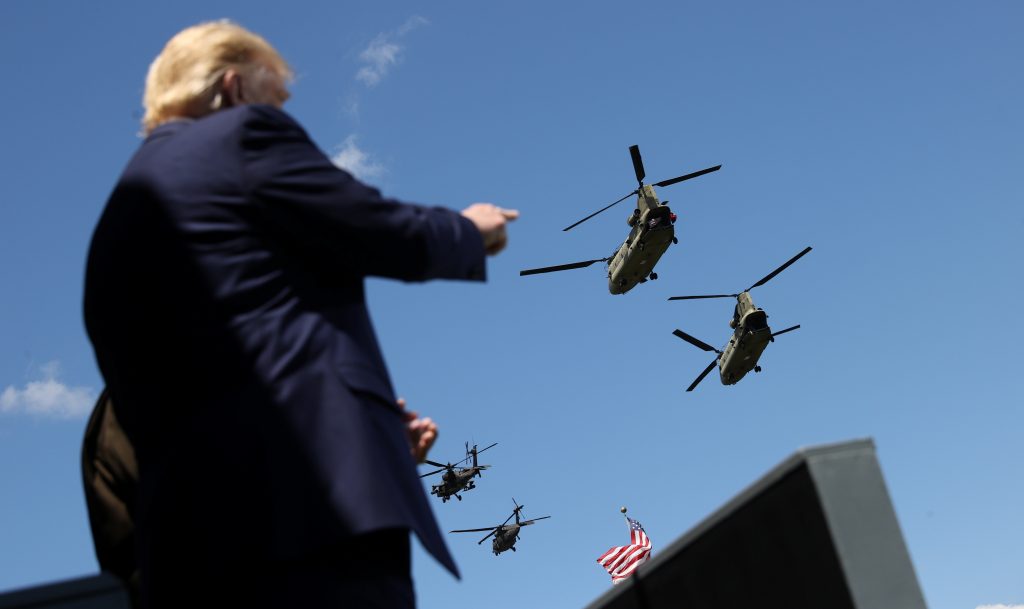
This week’s top reads circle around transatlantic relations and their enduring importance.
They start with Secretary General Jens Stoltenberg’s call at the Atlantic Council for a more political and global NATO, highlighted in the Economist.
Gary Schmitt and Giselle Donnelly in The American Interest look at the downsides of US troop withdrawal from Germany and why so many Republican members of Congress are against it.
British journalist Gary Younge and the Atlantic Council’s Ben Haddad reflect on why Europeans in such numbers are out protesting in response to US race matters.
Stanford Law professor Nathan Persily identifies one of the prerequisites for the US role in the world, healthy elections, and he provides a roadmap for heading off a November disaster.
This week’s must-read comes from John Ikenberry in Foreign Affairs, looking at why our times require a reboot of the international liberal order that the United States helped invent. He suggests augmenting the G-7 to build a D-10 group of ten leading democracies, a project the Atlantic Council has long championed. Erik Brattberg and Ben Judah second that motion in Foreign Policy, beginning by taking on supply chain and 5G vulnerabilities.
#1. A MORE GLOBAL ALLIANCE
NATO sets its sight on China
THE ECONOMIST
Remarks by NATO Secretary General Jens Stoltenberg on launching #NATO2030
NATO
NATO Secretary General Jens Stoltenberg came to the virtual Atlantic Council last Monday to launch a reflection called “NATO 2030.” His vision is that of a NATO that would be both more political and global – while maintaining its military strength.
“The rise of China is fundamentally shifting the global balance of power,” he said with welcome clarity. “Heating up the race for economic and technological supremacy. Multiplying the threats to open societies and individual freedoms. And increasing the competition over our values and way of life.”
He noted that NATO, “the only place that brings Europe and North America together, every day,” represents about a billion people, half the world’s economic and military might, and a network of global partners. Yet for too long some of its members have prevented it from tackling non-military issues of political and global significance.
Changing that could make a world of difference to NATO — and could help NATO make a difference in the world. Read More →
#2. DON’T CUT U.S. TROOPS THIS WAY
The German Drawdown Debacle
Gary Schmitt and Giselle Donnelly / THE AMERICAN INTEREST
22 Hasc Republicans Object to Reducing U.S. Forces in Germany
HOUSE ARMED SERVICES COMMITTEE
Writing in The American Interest, Gary Schmitt and Giselle Donnelly examine why keeping US troops in Germany is very much in, well, the American interest.
“As more than two dozen Republican House Armed Services Committee members have noted,” they write, “a ’limit on troops would prevent us from conducting the exercises that are necessary for the training and readiness of our forces and those of our allies. The troop limit would also significantly reduce the number of U.S. forces that can flow through German for deployment to bases around the world, causing serious logistical damage.” Read More →
Read the whole Congressional statement to understand why President Trump’s usual allies are opposing him on this one. Read More →
#3. EUROPE AND BLACK AMERICA
What Black America Means to Europe
Gary Younge / THE NEW YORK REVIEW
Europe’s Love-Hate Protests Against America
Benjamin Haddad / FOREIGN POLICY
Why are so many Europeans protesting U.S. racism and police brutality?
Gary Younge, a British journalist of Barbadian extraction, writes in the New York Review of Books about the long and complex history of “Europe’s identification with Black America, particularly during times of crisis, resistance and trauma.”
“From the vantage point of a continent that both resents and covets American power, and is in no position to do anything about it,” he writes, “African-Americans represent to many Europeans a redemptive force; the living proof that the US is not all it claims to be and that it could be so much greater than it is.” Read More →
The Atlantic Council’s Benjamin Haddad, writing in Foreign Policy, believes widespread European protests in recent days reflect both frustration in current US leadership and “sympathy for a nation they still want to believe in.” He also sees them as “a sign of America’s continued power and relevance.” Read More →
#4. PROTECTING U.S. ELECTIONS
It’s Not Too Late to Save the 2020 Election
Nathaniel Persily / THE WALL STREET JOURNAL
Inflection Points typically focuses on international issues, but few matters are more significant on a global scale than the health of America’s democracy and the fairness of its elections.
Early primaries suggest that without urgent action to prepare the country for mail voting and safe, convenient polling places, “the 2020 election could be a full-on crisis for American democracy,” writes Stanford Law’s Nathaniel Persily in the weekend Wall Street Journal. “We need to prepare for this election as we would for a natural disaster like an earthquake or hurricane – and unlike a natural disaster, we have five months of warning.”
Yet there isn’t a day to waste. Read More →
#5. BUILDING THE D-10
The Next Liberal Order. The Age of Contagion Demands More Internationalism, Not Less
G. John Ikenberry / FOREIGN AFFAIRS
Forget the G-7, Build the D-10
Erik Brattberg, Ben Judah / FOREIGN POLICY
This week’s must-read is John Ikenberry’s compelling look in Foreign Affairs at the history of the international liberal order that the U.S. built with its allies, why it must be saved as the best existing course forward, and then how to go about doing it.
He proposes turning the G-7 into a D-10, “a sort of steering committee of the world’s ten leading democracies to “rebuild a global order that protects liberal principles. “The leaders of this new group could begin by forging a set of common rules and norms for a restructured trading system,” he writes. Read More →
Writing in Foreign Policy, Erik Brattberg and Ben Judah see the beginnings of this more ambitious possibility in Boris Johnson’s proposal to use a D-10 structure to address vulnerable supply chains and 5G communications.
“While the idea behind a D-10 is not a novel one,” they write, as “a group organized by the Atlantic Council think tank in Washington has been promoting it for years with regular working level meetings between officials – it has a new impetus amid the coronavirus measures.” Read More →
Embracing this D-10 could be another antidote to decoupling.
QUOTE OF THE WEEK
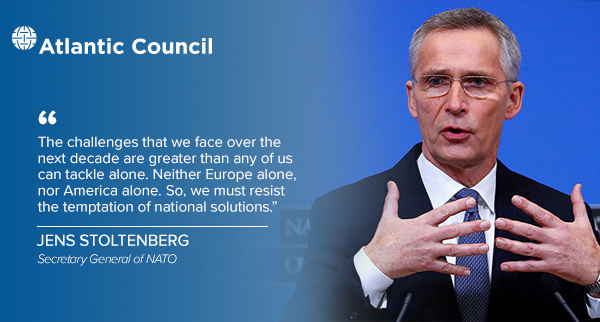
ATLANTIC COUNCIL TOP READS
Image: Golf - The 2012 Ryder Cup - The Medinah Country Club, Medinah, Illinois, United States of America - 27/9/12 General view of USA and Europe flags during the opening ceremony Mandatory Credit: Action Images / Paul Childs
